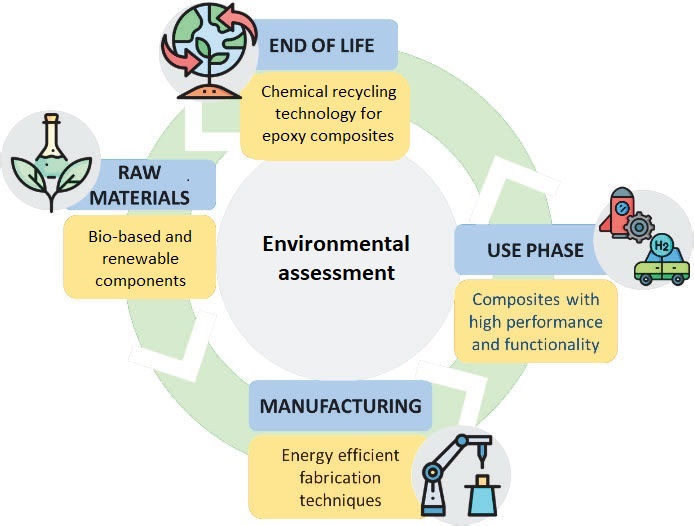A Safe, Sustainable and Performant Design towards the future lightweight materials
REPOXYBLE project aims to contribute to the development of a new generation of multifunctional, safe and sustainable by design epoxy-based composites. This new generation needs to provide advanced functionalities and at the same time overcome current thermosets recycling difficulties and consider safety, legal and environmental concerns from their early design stages.
This will be achieved through five objectives:
- Development of new chemistries for fast curing resins, new bio-based composites and novel production techniques with advanced functionalities with potential to extended use at temperatures up to 300°.
- Integrate new multifunctional composites with enhanced thermal and electrical conductivity for thermal management and in-situ strain sensing.
- Achieve and demonstrate a closed loop energy efficient recycling system.
- Develop energy efficient lightweight composites with positive environmental impact over their entire life cycle.
- Demonstrate the economic feasibility in different market applications, business models and circular value chains for lightweight bio-based components, improving time to market.

Interdisciplianry approach
Our team is multidisciplinary and cross functional, integrating all the needed expertise both from material development and manufacturing, and from recycling and safety and sustainability, ensuring a holistic and collaborative approach.
Methodological and policy background
REPOXYBLE background has its roots in the EU Strategic Research and Innovation Plan for safe and sustainable Chemicals and Materials (SRIP), that “highlights current research and innovation areas crucial for accelerating the transition to chemicals and materials that are safe and sustainable”. The Safe and Sustainable by design concept has been introduced in EU R&I policies with the Chemical Strategy for Sustainability (CSS) towards a toxic-free environment and more recently with the publication of the Safe and Sustainable by Design Framework. The concept is discussed also at international level, as show by the work of OECD (SSIA, Steering Group on Safer and Sustainable Innovation Approach). Considering safety and sustainability since the early stages is emphasised also in different industry -led initiatives, such as the Advanced Materials Initiative 2030 (AMI2030) and the work of CEFIC on the matter.
Advanced materials are enablers for a diversity of industrial sectors, and crucial for EUs technology leaderships and strategic autonomy. As emphasised by AMI 2030, their development need, “a strong European Materials ecosystem driving the green and digital transition as well as a sustainable inclusive European society through a systemic collaboration of upstream developers, downstream users and citizens and all stakeholders in between”.
In this context, the Horizon Europe framework programme has funded a series of projects dealing with the implementation of SSBD approaches in advanced materials development, including REPOXYBLE, that will lead the way to integrate this approach in future R&I activities.

